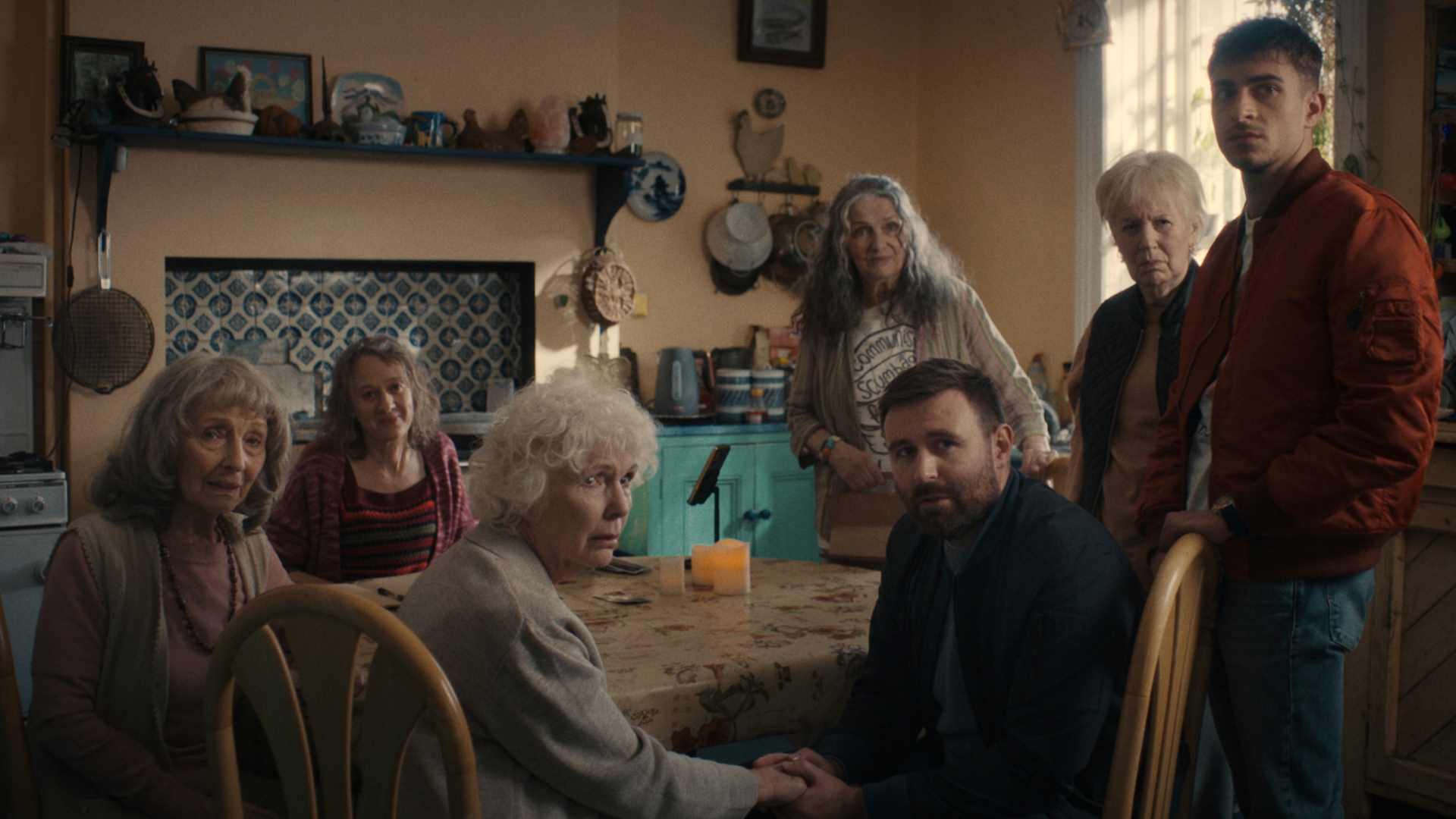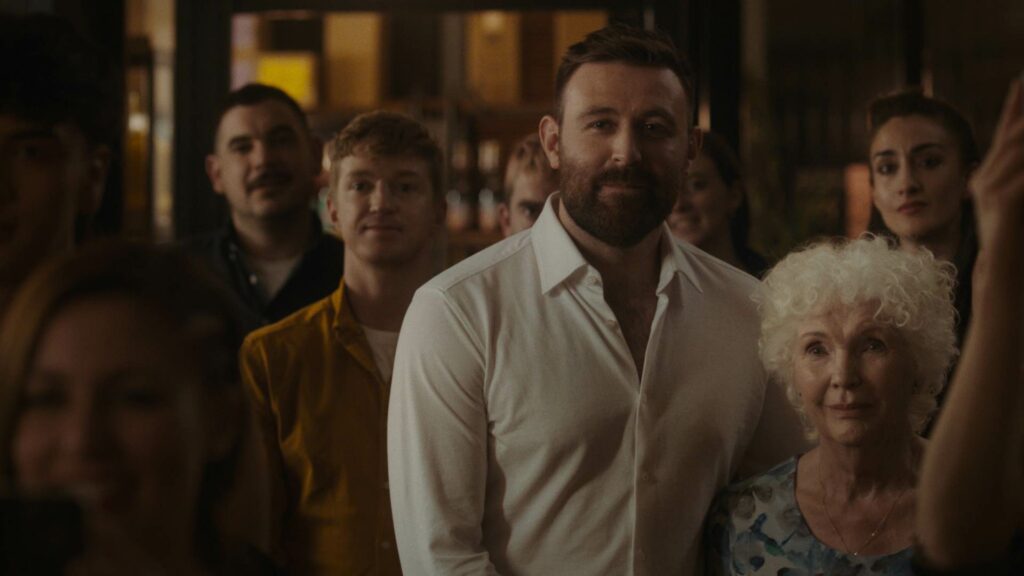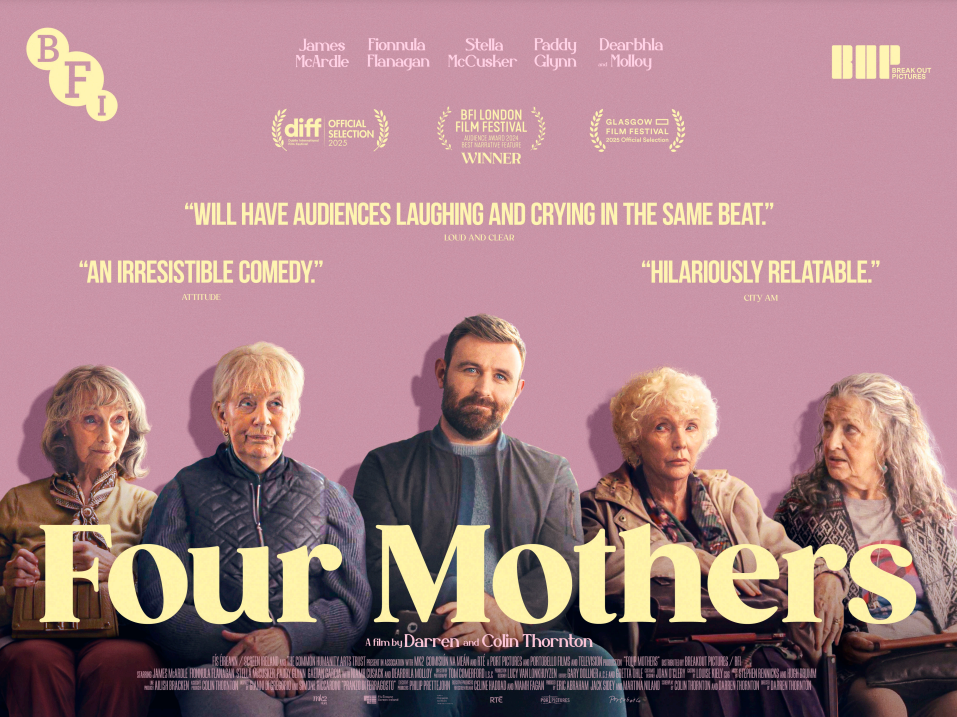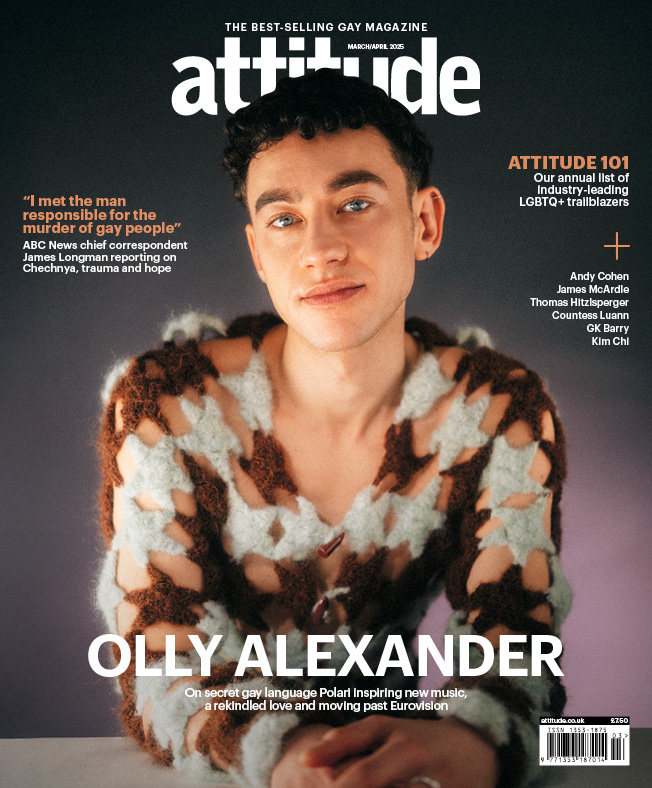James McArdle and Four Mothers director and writer talk mothers, gay sons and Andrew Scott’s accent coaching (EXCLUSIVE)
"We had the idea of it being about middle-aged gay men because we hadn’t seen that before,” says the film's director Darren Thornton
By Gary Grimes

The Irish brogue is one of the most frequently butchered accents in film history. Even Jamie Dornan defied expectations with a shockingly caricature country Irish twang in Irish Mountain Thyme — despite actually being Irish. It’s why I feel compelled to compliment Scotsman James McArdle on his extremely convincing Irish accent in his role as lead character Edward in the upcoming film Four Mothers, co-written by brothers Colin and Darren Thornton, from Ireland’s County Louth.
“That’s good,” McArdle replies when I mention how undetectable his real accent was in the film. “Andrew Scott was sort of my stealth accent coach, along with Colin and Darren. It was a triumvirate,” he tells me.
Colin adds with a laugh, “When I first heard James’s accent, I was like, ‘You just sound exactly like Andrew Scott, no?!’”
Although the film is adapted from the Italian film Mid-August Lunch, there is a great deal of Colin and Darren in Four Mothers, beyond just their accent coaching. The brothers wrote the script after their own mother, Trish, to whom the film is dedicated, became seriously ill just as their first film, 2016’s moving comedy A Date for Mad Mary, was released to critical acclaim. “Myself and Darren had essentially become full-time carers for her, and found ourselves moving back to our family home,” says Colin. “At the same time, this DVD had come through of the Italian film [Mid-August Lunch].”

After watching the DVD and immediately resonating with the film’s plot, the pair began to figure out how to make it their own. One change was to make Edward gay, with Colin drawing on his experiences as a gay man. Edward is a middle-aged novelist who is on the brink of international success with his latest book while also living back home and caring full-time for his 81-year-old mother Alma. A stroke has left her wheelchair-bound and unable to speak, so Edward tends to her every need.
He is friends with a local group of gays who are also caring for their mothers, and whose closest thing to a social outlet is commiserating with each other about their unfulfilled lives in the back pew of the church where they routinely take their elderly mothers to Mass.
“The original is not a gay story,” explains Darren, who also directed the film. “It’s more of a chamber piece, all set in this apartment. We opened the story out a little bit more and then fused it with elements of our own biography and things that we were going through at that time, and our relationship with our mum.”

Another aspect which borrows heavily from the brothers’ lives is Edward’s gaggle of gays who, early on in the film, up-end his weekend by leaving their mothers on his doorstep for him to care for while they attend Maspalomas Pride, knowing he is wont to oblige. “I’m not gay, but me and Colin have the same friendship group and are sort of part of the same community,” Darren reveals. “So, one of the first ideas that we had was the idea of it being about middle-aged gay men because we hadn’t seen that before.”
In spite of their sheer insolence, Edward’s friends maintain a likeability whenever we encounter them, often appearing via video call to Edward from the hedonistic backdrop of Gran Canaria. This can be credited to the brothers’ generous, affectionate writing of the characters, thanks to the well of inspiration they had by virtue of their real-life pals. There are also charming performances from actors Gearóid Farrelly, Gordon Hickey and Rory O’Neill — also known as Panti Bliss, Ireland’s drag superstar and one of the faces of the country’s successful 2015 marriage equality campaign — as Edward’s recently out-of-the-closet therapist.
For McArdle, who many viewers will have most recently seen starring opposite James Norton in ITV’s psychological thriller Playing Nice, Edward is a role that gives him a lot to play with. Although we sympathise with him over the predicament in which he finds himself, he can also be infuriating to watch. He’s indecisive, martyred, and at times pretentious. Anyone who’s ever caught themselves ranting about the nuances of feminism or the merits of identity politics to an older relative will find themselves watching with clenched teeth as Edward occasionally flexes his intellectual muscle, waxing lyrical to his cohort of ladies who either look back at him completely nonplussed or somewhat bewildered. “I think that’s actually quite an important part of him,” McArdle tells me. “He goes on this rant about how these men repressed [the women] and he’s sort of checked on it… They challenge him in that regard, and hopefully, moving forward, he won’t be so pompous as he pontificates.”
At the film’s core is the strained but tender relationship between Edward and Alma, played by the inimitable Fionnula Flanagan, recognisable to many from her turn as Eloise Hawking in LOST. The bond between a gay man and his mother is often sacred and this rich dynamic is harvested for both laughs and tears in the film. “I think Irish mums of gay sons get to a certain point in their lives where their sons and all of their son’s queer friends spoil them rotten and make such a fuss over them,” says Colin. “They’re kind of celebrated for their fashion sense and personalities and almost turned into little gay icons in their own right!”
The brothers’ loving dynamic is on full display as we chat, with Darren chiming in with this observation of Colin’s connection with their mother: “I was always fascinated, I think because you prioritise, like, nice things, and Mum loved that. I’m much more sloppy in terms of how I present and how I live. She would really grab it, to have that closeness and bond with you over the nice places that you might go to eat or something.”
“For gay men, we all have the experience where we’ve had to come out to our parents at some point, and for a lot of gay men of a certain age — not always but oftentimes — that experience was quite fraught,” Colin posits. “I suppose the intensity of that, and then the kind of healing that comes from that experience later on in life, forms a very tight bond between a mother and a gay son that I think is quite different to the bond that a mother has with her straight son,” he goes on, before looking to Darren for his view as “the straight son”.

“I think that’s bang on; it’s a totally different thing,” Darren agrees.
Alma and all four of the mothers are written with a great deal of empathy for the struggles they’ve faced, particularly dwelling on how three of them are coping with the loss of their husbands and, conversely, how the fourth, an unmarried mother, has grappled with a lifetime of single motherhood. The Thorntons have managed to create four very authentic, individual characters with mothers who provide plenty of comedy moments while steering clear of clichéd ‘Irish mammy’ caricatures.
The crafting of these complicated matriarchs is greatly enhanced by the expert casting of Stella McCusker, Dearbhla Molloy and Paddy Glynn opposite Flanagan.
Finding actresses for roles in this demographic was an unexpected challenge, Darren explains. “We thought, ‘OK, this should be kind of easy enough because there’s not a great deal of scripts around, so we should probably get our first choices,’” he recalls. “And we couldn’t have been more wrong. We went out to a lot of people, and the same note kept coming back, which was that so-and-so doesn’t want to do it because they feel if they take this on, then all they’ll get offered from then on is roles where they’re of diminished capacity or they’re unwell,” he reveals. “A lot of people turned it down. They’d write us nice notes, admiring the script, but didn’t want to enter in, so it took about a year before we found the ladies.”
Thankfully, they had more luck casting the male roles. “Particularly with Rory. That was a late idea, and we were really fortunate that he responded to it,” says Darren. “There’s not a lot of actors within that age range, strangely. Most gay actors that were coming to us were a lot younger, so we got lucky with the guys.”
Alma’s French home nurse, Raf, who we eventually learn is Edward’s ex-boyfriend, is played by Gaetan Garcia. “Originally, that character was Irish, and we talked about the possibility of a Brazilian home nurse, but we thought maybe we had seen that before. There was something that was a bit fresh about that character being French,” explains Darren.
Both McArdle and the Thornton brothers hope that the film will create an opportunity for mothers and sons and carers to go to the cinema together, to share a viewing experience that hopefully sparks meaningful exchanges afterwards. “At the end of every screening so far, there’s usually a big gang of older gay men in their fifties and sixties and maybe even older, who are willing to have a conversation about their experience and the similarities,” says Darren. “We end up standing around talking for half an hour, and everyone’s just dying to share their story about losing their mum, or when they were caring for her.”
“I just love the idea of it being a communal experience that gay people, and the straights as well, can go to the cinema with their parents and experience it together and have a conversation afterwards,” says Colin.
Four Mothers is in UK cinemas from 4 April. The 39th BFI Flare: London LGBTQIA+ Film Festival takes place from 19–30 March 2025 at BFI Southbank.
This interview was lifted from Issue 363 of Attitude magazine which is available to order here, and alongside 15 years of back issues on the free Attitude app.

